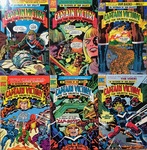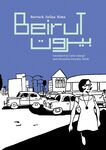
edited by Ivan Brunetti It's too early to say for certain, but this follow-up to Brunetti's already classic 2006 anthology, also published by Yale University Press, might just be even better than its precursor. One thing's for certain: Brunetti has held onto -- and further refined -- his editorial vision of arranging the work contained in this volume in an organic sequence, deftly managing to map out the similarities between artists so that each piece flows smoothly into into the other, creating an amazing sense of an innate connectivity between all areas of comics here on display. This book is a powerful ally in the struggle to bring the light of comics to those poor souls still dwelling in the darkness. It's the perfect choice to turn on a friend or relative to the joy, beauty and pleasures of our favorite medium. Hold onto your hats, here's the contributor list: Daniel Clowes, Saul Steinberg, Sammy Harkham, Chris Ware, R. Sikoryak, Michael Kupperman, Drew Friedman, Mark Beyer, Mack White, Jayr Pulga, Renee French, Kim Deitch, Richard Sala, J. Bradley Johnson, Archer Prewit, Anonymous (utility sketchbook), HJ Tuthill, Milt Gross, Bill Holman, Harvey Kurtzman, R.Crumb, Basil Wolverton, Art Spiegelman, Jess, John Hankiewicz, Tim Hensley, Bill Griffith, Richard McGuire, Gilbert Hernandez, Jim Woodring, David Collier, Eugene Teal, Charles Burns, Karl Wirsum, Gary Panter, Paper Rad, Fletcher Hanks, CF, Charles Forbell, Ron Rege, Jr., Winsor McCay, Matthew Thurber, Souther Salazar, Kevin Scalzo, Megan Kelso, James McShane, Laura Park, Vanessa Davis, Onsmith, Joe Matt, Jeffrey Brown, Martin Cendreda, Dave Kiersh, John Porcellino, Carrie Golus/Patrick Welch, Jessica Abel, Cole Johnson, Lynda Barry, Debbie Drechsler, Diane Noomin, Aline Kominsky-Crum, Ariel Bordeaux, Chester Brown, Anders Nilsen, Joe Sacco, Phoebe Gloeckner, Elinore Norflus, Brian Chippendale, Leif Goldberg, David Mazzuchelli, Jerry Moriarty, Ben Katchor, Frank Santoro, Dan Zettwoch, Kevin Huizenga, Harvey Pekar/R.Crumb, Carol Tyler, Maurice Vellekoop, Seth, Adrian Tomine, Jaime Hernandez & David Heatley. It's simply amazing. Comics Power! PLEASE NOTE: We feel compelled to mention that this volume includes several pieces that contain quite explicit sexual content; and while this content represents only a miniscule fraction of the total, it nevertheless renders this volume fit for ADULTS ONLY.

Just found in The Archives! (a small stack of new copies... gone!)
This is a swellegant hardcover from New York University Press – complete with tranlucent dust jacket and 50 page introduction by Ari Kelman, an American Studies prof at UC Davis. This book is mostly composed of Gross's prose humor, replete with Yiddish dialect (that will likely remind some readers of Krazy Kat's – or "ket's" – dialogue) but there are over a hundred cartoons and/or comics scattered throughout this volumes 300 pages, making for a great introduction to this multifaceted talent.
SUPER SPECIAL PRCE!
And here's the NYU Press info:
Milt Gross (1895-1953), a Bronx-born cartoonist and animator, first found fame in the late 1920s, writing comic strips and newspaper columns in the unmistakable accent of Jewish immigrants. By the end of the 1920s, Gross had become one of the most famous humorists in the United States, his work drawing praise from writers like H. L. Mencken and Constance Roarke, even while some of his Jewish colleagues found Gross’ extreme renderings of Jewish accents to be more crass than comical.
Working during the decline of vaudeville and the rise of the newspaper cartoon strip, Gross captured American humor in transition. Gross adapted the sounds of ethnic humor from the stage to the page and developed both a sound and a sensibility that grew out of an intimate knowledge of immigrant life. His parodies of beloved poetry sounded like reading primers set loose on the Lower East Side, while his accounts of Jewish tenement residents echoed with the mistakes and malapropisms born of the immigrant experience.
Introduced by an historical essay, Is Diss a System? presents some of the most outstanding and hilarious examples of Jewish dialect humor drawn from the five books Gross published between 1926 and 1928—Nize Baby, De Night in de Front from Chreesmas, Hiawatta, Dunt Esk, and Famous Fimmales—providing a fresh opportunity to look, read, and laugh at this nearly forgotten forefather of American Jewish humor.
REVIEWS
“It is Gross’s good fortune, and ours, that a most recent generation of Americans has reclaimed him as its own or, at the very least, brought his talents to the fore once more. Is Diss a System? A Milt Gross Comic Reader is a case in point, a showcase of his many gifts. . . . In his championing of Milt Gross, Kelman assumes his rightful place as a cultural archaeologist of American Jewry’s vernacular culture. He belongs, in fact, to a new generation of American Jewish intellectuals who are determined to recover—and to celebrate—what their forbears had consigned to the attic or dismissed as a curiosity.’
—The New Republic
“Milt Gross is a lost wonder of the American literary funhouse. A blessing on the head of Ari Y. Kelman for bringing him, roaring, back to mad and vivid life.”
—Michael Chabon, author of The Yiddish Policemen’s Union: A Novel
“Nearly thirty years before my birth, Milt Gross had already turned the kind of English that I heard every day into great and significant art, delighting kids like me as much as he offended the Pecksniffian alte kakers who sought to purge American Jewish culture of every trace of real Yiddish and real Yiddish life. Gross was the bomb under Molly Goldberg’s tukhes. Is Diss a System?, a book that needs to be spoken as much as it needs to be read, makes some of his best work available to an audience that might never have suspected what it’s been missing.”
—Michael Wex, author of Born to Kvetch and Just Say Nu
“Is Diss a System? brings back Milt Gross with a bang. Artist, tongue-twisting language humorist, Gross was a great figure of American popular culture in the first half of the twentieth century, sadly forgotten . . . until now! Kelman has given us all a gift by selecting, annotating and celebrating a multiculturalism that rings with humor, humanism and a spirit we all need as much as ever. Hurrah!”
—Paul Buhle, editor of Jews and American Comics

We got our hands on a couple of these gigantic (13" x 16") deluxe Sunday Press hardcovers, if anyone is interested...
The Meshuga Comic Strips of Milt Gross 1926-1934Sunday strips and illustrations from the king of screwball comics
The hilarious comics of Milt Gross were born of the Yiddish humor in vaudeville and grew to lampoon all the foibles and quirks of everyday life. Here is a curated collection of the major comic strips of Milt Gross— Nize Baby, Count Screwloose, and Dave’s Delicatessen —along with other comics, books and illustrations from his prolific career. Most of these lost gems have never been reprinted before!
Ivan Brunetti sez: "Genius can manifest itself in two ways: the unfathomably complex, and the unfathomably simple. Milt Gross belongs to the latter category. He is one of the all-time great cartoonists because he makes the craft integral to the entire endeavor look so easy, even enjoyable. When I envision the word “cartooning” in the dictionary, the accompanying illustration is always a drawing by Gross: Nize Baby, Iggy, Count Screwloose, or any number of walk-on characters from his strips. These spirited drawings embody cartooning both as noun and verb. Gross is an elemental force, and his command of line and form convincingly argues for cartooning as the purest, the most natural, instinctive, and expressive—it’s tempting to say the only—way to draw.
Mark Newgarden sez: "Gross was first and foremost a product of American popular culture and operated with the understanding that his latest gag had already begun disintegration on contact with oxygen (as all popular culture must). And while his generation’s bag of tricks has been long absorbed into the hardpacked humus of cartooning convention, this restless artist’s best work remains a revelation, compulsively energetic and still uncompromisingly funny. His mature line work in particular maintains a markedly fresh vigor and offhanded edginess that offers up as much a whiff of the avant-garde as of a Bronx-bound IRT."
And check out this interview/conversation between screwball comics scholar, Paul Tumey and Sunday Press publisher, Peter Maresca.










